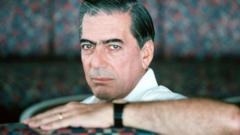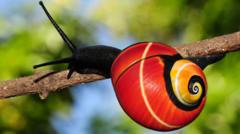Mario Vargas Llosa, the renowned Peruvian author and Nobel laureate, passed away at 89, remembered for his contributions to literature and his polarizing political views. Born in 1936 in Arequipa, Peru, he authored over 50 works, earning acclaim for tackling themes of authoritarianism and social injustice. Emerging from the influential Latin American Boom of the 1960s, his early works, like "The Time of the Hero" and "Conversations in the Cathedral," confronted the political turmoil of the era. His complex relationship with fellow writer Gabriel García Márquez and his political evolution—from a leftist sympathizer to a right-leaning presidential candidate in 1990—marked his life. Despite controversies, including critical remarks on feminism and the dangers to journalists, he continued to provoke thought until his death in Lima, leaving a profound impact on literature and culture.
Mario Vargas Llosa: A Literary Titan and Polarizing Figure of Latin America

Mario Vargas Llosa: A Literary Titan and Polarizing Figure of Latin America
Mario Vargas Llosa, a leading voice in Latin American literature, died at the age of 89, leaving behind a legacy defined by powerful storytelling and political controversy.
Mario Vargas Llosa, who has died at the age of 89 in his native Peru, was a towering figure in Latin American literature and culture who rarely shied away from controversy. With more than 50 works to his name, many of which have been widely translated, Vargas Llosa won the Nobel Prize for Literature in 2010 when judges dubbed him a "divinely gifted story-teller". His depictions of authoritarianism, violence, and machismo, using rich language and imagery, made him a star of the Latin American Boom literary movement that shone a global spotlight on the continent.
At first sympathetic to left-wing ideas, he grew disillusioned with Latin America's revolutionary causes, eventually running unsuccessfully for the Peruvian presidency with a center-right party in 1990. Vargas Llosa was born in 1936 to a middle-class family in Arequipa in southern Peru. After his parents separated while he was an infant, he moved to Cochabamba in Bolivia with his great-grandparents. He returned to Peru aged 10, and six years later he penned his first play, "The Escape of the Inca." He graduated from Lima University, studied in Spain, and later moved to Paris.
His first novel, "The Time of the Hero," served as a critique of corruption and abuse at a Peruvian military school. Written during a time when the military wielded significant political and social power in Peru, it was published in 1962. Its vivid and haunting imagery drew ire from several Peruvian generals; one dismissed Vargas Llosa as having a "degenerate mind." The novel was inspired by Vargas Llosa's own traumatic experience at the Leoncio Prado Military Academy, which he later described as having shaped his perception of Peru as a society filled with violence and deep-seated social tensions.
Following this, his experimental second novel, "The Green House" (1966), set in the Peruvian desert and jungle, depicted a complex interplay among pimps, missionaries, and soldiers around a brothel. Together, these novels helped establish the Latin American Boom—a literary movement marked by experimental narratives and political themes that resonated within a tumultuous continent.
Gabriel García Márquez, a fellow luminary of the Boom, became both a friend and rival to Vargas Llosa, famed for his magical realism. Their relationship famously soured after Vargas Llosa punched García Márquez in 1976 over their disagreements on Cuba and Castro's regime, leading to decades of silence between them before reconciling in 2007. Three years later, Vargas Llosa received the Nobel Prize—the first South American writer to earn this honor since García Márquez in 1982.
Much of Vargas Llosa's oeuvre reflects the instability and violence prevalent in Latin America during the latter half of the 20th century, characterized by revolutions and military governance. His work "Conversations in the Cathedral" (1969) earned acclaim for its unflinching portrayal of the human toll exacted by the Peruvian dictatorship of 1948-56 under Manuel Odría.
Initially supportive of Fidel Castro, Vargas Llosa became disenchanted after witnessing the "Padilla Affair," wherein Cuban poet Heberto Padilla was imprisoned for dissent in 1971. In 1983, he led an investigation into the Uchuraccay massacre, where eight journalists were killed in the Peruvian Andes. His commission's report, backing the officials' narratives while discounting allegations of state-sponsored violence, drew significant backlash and criticism.
Shifting further right politically, Vargas Llosa ran for president in 1990 representing the centre-right Frente Democrático, a neoliberal coalition, but lost to Alberto Fujimori. Despite the controversies surrounding his political affiliations and his role in literary discourse, Vargas Llosa persisted in critiquing state power and violence through his writing. His novel "The Feast of the Goat" (2000) scrutinized the dictatorship of Rafael Trujillo in the Dominican Republic, earning praise from the Nobel committee for its examination of authority and individual resistance.
His final works tackled diverse subjects, including Irish nationalist Roger Casement in "The Dream of the Celt" (2012). Spending his last years between Peru and Madrid, he stirred public interest when he left his wife of 50 years in 2015 for socialite Isabel Preysler, mother of singer Enrique Iglesias. Vargas Llosa, a polarizing figure in his later years, sparked debates through controversial comments regarding journalism and feminism—calling the latter the "most determined enemy of literature."
On 13 April, he passed away in Lima, surrounded by family and reportedly at peace. His death signifies the loss of the last literary giant of the Latin American Boom, leaving a rich but complex legacy in literature and thought.
At first sympathetic to left-wing ideas, he grew disillusioned with Latin America's revolutionary causes, eventually running unsuccessfully for the Peruvian presidency with a center-right party in 1990. Vargas Llosa was born in 1936 to a middle-class family in Arequipa in southern Peru. After his parents separated while he was an infant, he moved to Cochabamba in Bolivia with his great-grandparents. He returned to Peru aged 10, and six years later he penned his first play, "The Escape of the Inca." He graduated from Lima University, studied in Spain, and later moved to Paris.
His first novel, "The Time of the Hero," served as a critique of corruption and abuse at a Peruvian military school. Written during a time when the military wielded significant political and social power in Peru, it was published in 1962. Its vivid and haunting imagery drew ire from several Peruvian generals; one dismissed Vargas Llosa as having a "degenerate mind." The novel was inspired by Vargas Llosa's own traumatic experience at the Leoncio Prado Military Academy, which he later described as having shaped his perception of Peru as a society filled with violence and deep-seated social tensions.
Following this, his experimental second novel, "The Green House" (1966), set in the Peruvian desert and jungle, depicted a complex interplay among pimps, missionaries, and soldiers around a brothel. Together, these novels helped establish the Latin American Boom—a literary movement marked by experimental narratives and political themes that resonated within a tumultuous continent.
Gabriel García Márquez, a fellow luminary of the Boom, became both a friend and rival to Vargas Llosa, famed for his magical realism. Their relationship famously soured after Vargas Llosa punched García Márquez in 1976 over their disagreements on Cuba and Castro's regime, leading to decades of silence between them before reconciling in 2007. Three years later, Vargas Llosa received the Nobel Prize—the first South American writer to earn this honor since García Márquez in 1982.
Much of Vargas Llosa's oeuvre reflects the instability and violence prevalent in Latin America during the latter half of the 20th century, characterized by revolutions and military governance. His work "Conversations in the Cathedral" (1969) earned acclaim for its unflinching portrayal of the human toll exacted by the Peruvian dictatorship of 1948-56 under Manuel Odría.
Initially supportive of Fidel Castro, Vargas Llosa became disenchanted after witnessing the "Padilla Affair," wherein Cuban poet Heberto Padilla was imprisoned for dissent in 1971. In 1983, he led an investigation into the Uchuraccay massacre, where eight journalists were killed in the Peruvian Andes. His commission's report, backing the officials' narratives while discounting allegations of state-sponsored violence, drew significant backlash and criticism.
Shifting further right politically, Vargas Llosa ran for president in 1990 representing the centre-right Frente Democrático, a neoliberal coalition, but lost to Alberto Fujimori. Despite the controversies surrounding his political affiliations and his role in literary discourse, Vargas Llosa persisted in critiquing state power and violence through his writing. His novel "The Feast of the Goat" (2000) scrutinized the dictatorship of Rafael Trujillo in the Dominican Republic, earning praise from the Nobel committee for its examination of authority and individual resistance.
His final works tackled diverse subjects, including Irish nationalist Roger Casement in "The Dream of the Celt" (2012). Spending his last years between Peru and Madrid, he stirred public interest when he left his wife of 50 years in 2015 for socialite Isabel Preysler, mother of singer Enrique Iglesias. Vargas Llosa, a polarizing figure in his later years, sparked debates through controversial comments regarding journalism and feminism—calling the latter the "most determined enemy of literature."
On 13 April, he passed away in Lima, surrounded by family and reportedly at peace. His death signifies the loss of the last literary giant of the Latin American Boom, leaving a rich but complex legacy in literature and thought.


















